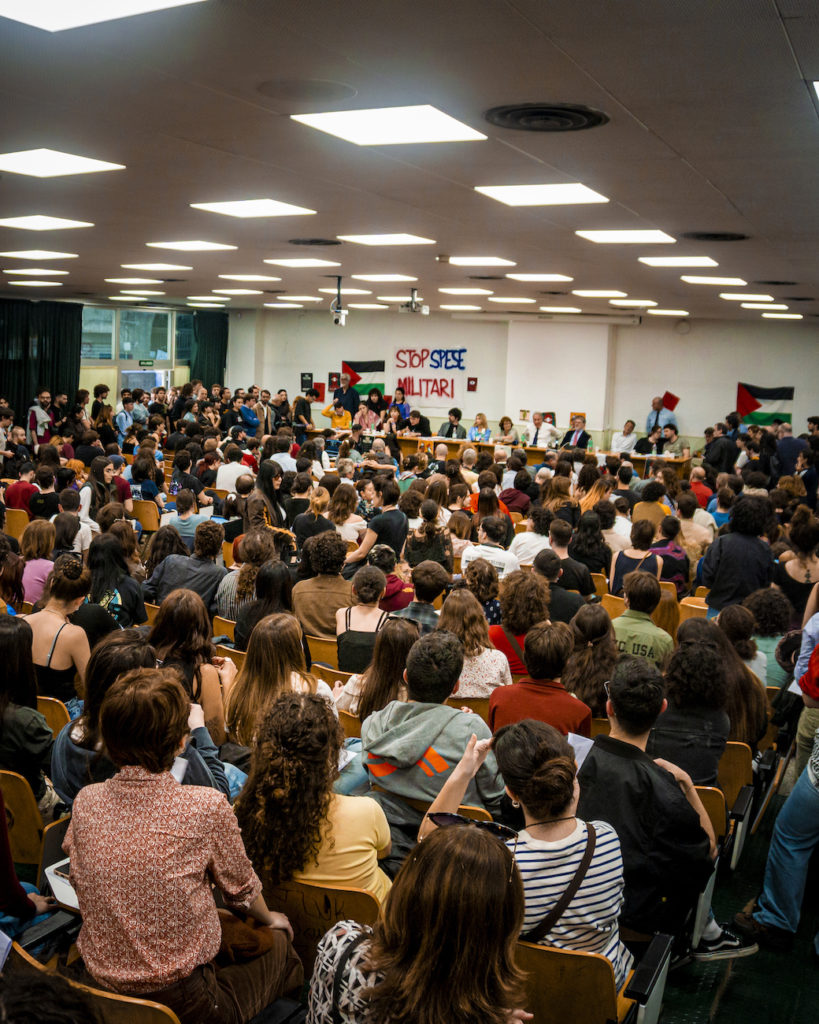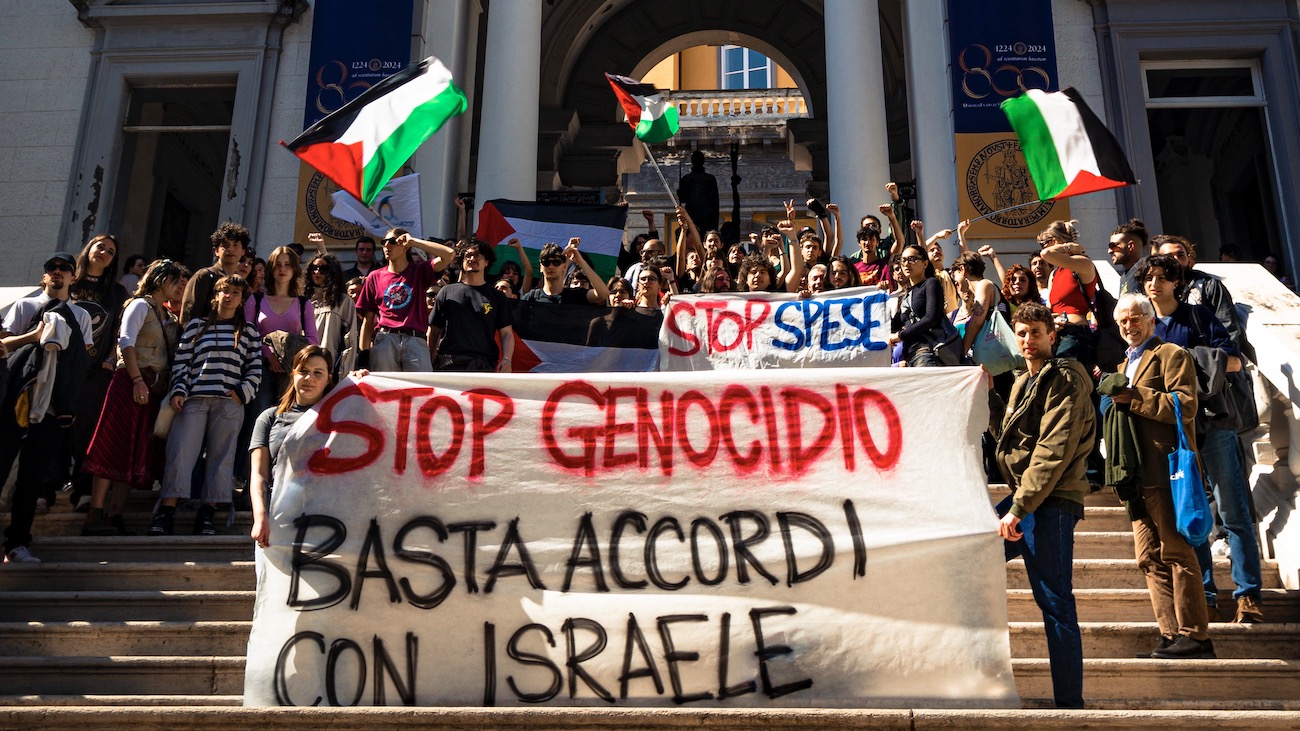“Birzeit University urges the international community to immediately intervene to stop this barbaric aggression and to protect Palestinians from the dramatic escalation of Israeli war crimes, crimes against humanity, and ethnic cleansing throughout all of Palestine.”
With these words, just 15 days after the Israeli aggression began in the Gaza Strip on October 7, 2023, the Palestinian University of Birzeit recalled the responsibility of the international academic world in the Palestinian question: to tell the truth about the genocide in Palestine and to isolate university institutions collaborating in it. The Zionist barbarism can be stopped only by increasing international pressure on all Israeli institutions economically, politically and even academically through boycotts, one of the most important tools which international solidarity movements have historically used in their struggles.
The progressive dismantling of the apartheid regime in South Africa demonstrates the effectiveness of boycott, divestment and sanctions campaigns (BDS) conducted globally in support of its liberation and self-determination. The Palestinian BDS movement also has a long history of investigations and battles which have been powerful in shedding light on economic ties and cooperation between Western countries and the Israeli government and companies. The achieved results are not only symbolic, they have a real impact on the apartheid regime.
As such, the academic boycott is an important resource for striking at Israel in places where it reproduces and culturally disseminates Zionist propaganda. Universities are not neutral places: Israeli universities actively contribute to colonial policies and Western universities make themselves complicit in them.
The role of Israeli universities
Three concrete examples illustrate the role of Israeli universities in the colonial and apartheid system. First, Tel Aviv university and the Hebrew University of Jerusalem are located on occupied and expropriated Palestinian territories, while Bar-Ilan University’s campus is in a colonial settlement in the West Bank. These universities are actively participating in the occupation of Palestinian land.
Second, all Israeli universities are fueling the climate and propaganda of war. They are encouraging students and young people to join the military, introducing benefits for students currently engaged in the Israeli Occupation Forces (IOF) and inviting them to focus on their “blessed deeds” while the universities are managing their academic absence. These kinds of actions thus provide for the involvement of the academic institutions in military operations.
Third, many universities have relationships of collaboration with companies engaged in the production of technologies used in the military or even direct ties with the IOF, as in the case of the Haifa Polytechnic, which, among other things, allocates annual scholarships for Arab students who decide to join the Israeli army to repress their own Palestinian brothers and sisters.
Interrupting the normal functioning of academic institutions
At such a delicate moment with more than 36,000 Palestinians killed in over six months of genocidal bombing, entire territories destroyed, and an offensive that does not seem to be coming to an end, students all around the world demand that their universities should take a stand. They have started with calling for the end of projects of collaboration such as the student exchanges with Israeli institutions, joint research and professor and teacher exchanges which allow Israel to preserve its “clean and democratic” image.
If academic institutions have shown indifference to the calls for solidarity that have come from Palestine and a guilty “equidistance” to the situation in Gaza, in the last seven months students’ mobilizations have shown that there is a part of the academia that does not want to make itself complicit of the genocide. Appeals for ending the genocide and an academic boycott signed by professors, students, researchers and precarious academic workers all over the world have been produced and shared globally (in Germany, in Italy and the international call “Philosophy for Palestine” which provoked a series of silencing and canceling).
Stop the collaboration between universities
Within this international framework, over the past two months, Italian students and youth organizations have decided to focus their efforts on putting pressure on academic institutions to block agreements with Israeli universities and stop collaborations with companies complicit in the genocide. After the important results obtained regarding the suspension of a call for cooperation promoted by the Ministry of Foreign Affairs (MAECI) in Pisa, Turin and Bari, a key victory for the entire boycott movement was also reached in Naples.

On April 8, 2024, students and researchers occupied the rector’s office of the Federico II University. Thanks to their mobilization, the university’s rector, Matteo Lorito, was forced to speak out during a public meeting. Addressing the over 500 young people and students who filled the lecture hall, the rector had no choice but to accept the demands that students have raised for months within the university. He pledged to resign from Med-Or, a foundation established on the initiative of Leonardo, one of the largest arms-producing and state-owned companies which collaborates with the Israeli government and military, and to retire the agreements currently in place between the Federico II and Israeli universities.
Dare to struggle, dare to win
These mobilizations confirm that mobilizations are reaching political results, not only by achieving their immediate objectives, but also by reversing the power relations between academic institutions and the students and by creating long-term organization among the youth. The achievement of the students’ struggle in Naples sets a key precedent for the entire Palestine solidarity movement, starting a chain reaction in the rest of Italy that is leading to occupations of rectories and public meetings, first in Milano, later in Rome. In response, the police are reacting more and more with repression and violence against the students, which, at least for the moment, has not caused a slow down of the protests.
The past seven months were a further proof of the ability of the youth to succeed in carrying out a plan of agitation, sedimenting political practices, and keeping mobilization alive. They were able to reverse the general rhetoric that pictures an apathetic and individualistic generation uninterested in building alternatives for its future. But in the face of the increase in repression and war propaganda led by the government, youth organizations continue to gather the anger of students in an internationalist perspective and challenge the present state of affairs. In this sense, they are the most advanced tip of Palestine solidarity today.





